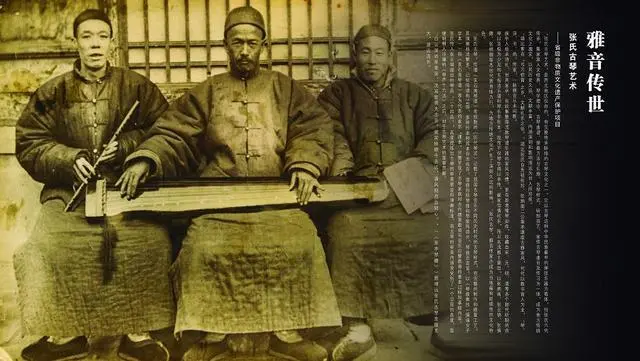Gansu Guqin Art -- Zhang's Guqin
The Guqin art represented by "Zhang's Guqin" in Gansu province is one of the only guqin culture with complete inheritance in Northwest China. It takes the guqin, the earliest string instrument of the Chinese nation, as the carrier, by the Zhang six generations of inheritance, set the family cultural cultivation, guqin theory, guqin music, playing methods and music theory, guqin style, skills, family guqin repertoire and practice as a whole, become the treasure of local traditional culture, with its long history, rich literature, deep connotation and far-reaching influence for the world to cherish.

"Jingyuan is known as the" hometown of bow, sword and armor, literature ritual and music custom ". The Zhang family of Jingyuan has been adhering to the modest and elegant family tradition since their ancestors Zhang Zhen and Zhang Bingnan. They have been teaching and educating people for generations. "Piano, poetry, calligraphy and painting" have been passed down from family to family, and a vein of elegant sound has never been interrupted.
The people of the family inherited poetic rites when they were young and learned from their family. They had the family custom of collecting and sorting out loose lyre and Musical Instruments. What is more, they are so fond of the qin that they collect the fine qin that is mainly made by the Song Dynasty, Yuan Dynasty, Ming Dynasty, Qing Dynasty and so on, as well as the rare ancient fingering music sheet music and qin music manuscripts. Therefore, not only the piano learning was passed down, the whole family was happy, but also a number of celebrities and noble figures were born. Outstanding representatives such as Zhang Bingnan, Zhang Yunjin, Zhang Shenwei and Zhang Xiaochao have exerted a profound and lasting influence on local traditional culture. "Zhang Guqin" Yayin inherits also become the most continuous local cultural characteristics.
The Guqin Style of the past Dynasties, which includes the biography of Zhang's Guqin and the Youshizhai Qinpu, records the guqin styles of different historical eras, and has complete production and restoration techniques. There are a variety of playing techniques. There are 14 known transcriptions, and many copies and copies are still extant. The music composition includes two parts: qin and qin songs, and there are nearly one hundred qin songs. The "textbooks" of family studies represented by "Qinqu Collection Copy (Shenduan Women's Study Book)" and "Youshizhai Qinpu" completely present the basic process and content of Guqin family's ancient moral education and music enlightenment education.
The "24 pieces" proposed by Zhang Yunjin, the successor of the Zhang family, highly refined the aesthetic gist and performance standards of the guqin, and found the aesthetic connotation of the guqin to an unprecedented height. It is an important contribution to the art of the guqin after Leng Qian's Sixteen Methods of the Guqin.
Guqin artists, represented by Zhang Bingnan, Zhang Yunjin and Zhang Shenwei, are skilled in calligraphy, painting and literature, and have written numerous works. Their works, such as Shuilu Poetry Manuscript, Wuxia Will Record, Lanzhou Spring and Autumn Annals, are too numerous to be enumerated, and their original manuscripts are mostly stored in Gansu Library, Qinghai, Sichuan, Henan Museum of Literature and History and local museums. The family's "calligraphy and painting cultivate one's self and piano learning pass down from generation to generation" has built a complete family inheritance system, highlighting profound and unique humanistic values.
"In the depths of the white clouds, the cottage is deep. Mo Xiaozhong period today to far, the breeze bright moon from the bosom." May the Jingyuan Zhang-style Guqin be carried forward and have a long history.
 渝公网安备 50010702504639号
渝公网安备 50010702504639号